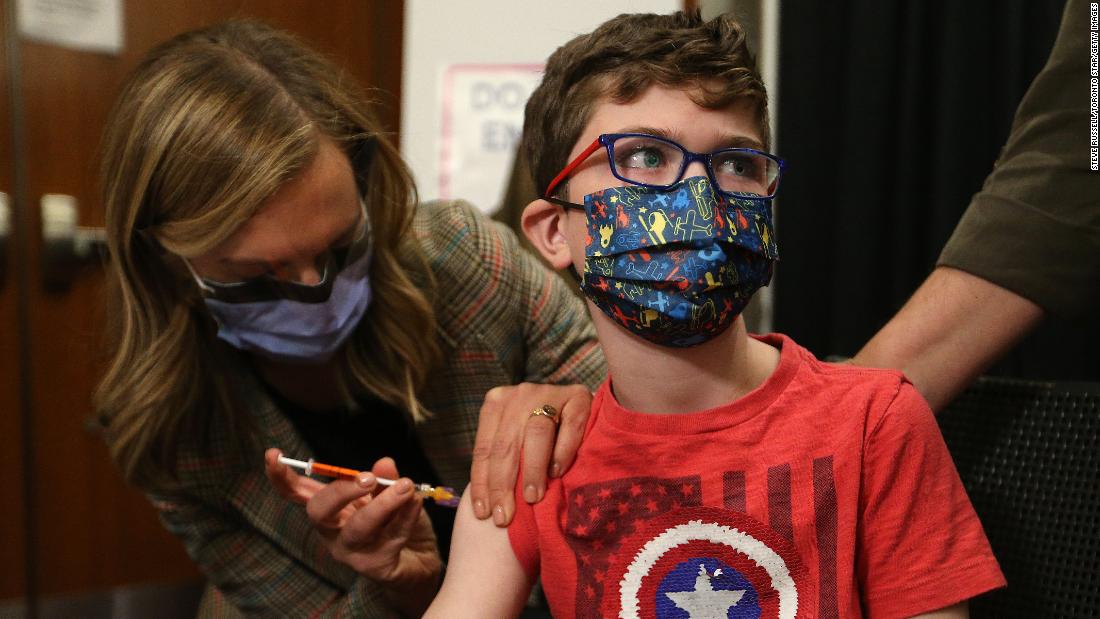Covid-19 cases increase in children in the US 0:34
(CNN) -
In a new provisional statement, the World Health Organization (WHO) on Wednesday asked countries to consider the benefits of vaccinating children and adolescents against COVID-19, but to prioritize the exchange of vaccines. worldwide before proceeding to vaccinate minors.
"Countries should consider the individual and population benefits of immunizing children and adolescents in their specific epidemiological and social context when developing their immunization policies and programs against COVID-19," said the statement, released Wednesday.
The WHO has long argued that older adults, people with chronic diseases and healthcare workers should have priority for vaccinations and that it is "less urgent" to vaccinate children.
The new statement acknowledges that some countries that have already distributed vaccines to those priority groups, including the United States, are now rolling out vaccines for children.
In addition to the US and most members of the European Union, other countries that vaccinate children include Cuba, which was the first country to vaccinate children as young as 2 years as of September, Chile, China, El Salvador and the United Arab Emirates.
Covid-19 reinfection is rare;
serious illness, even more so, according to a study in Qatar
Equity issue
"As a matter of global equity, while many parts of the world face extreme vaccine shortages, countries that have achieved high vaccine coverage in their high-risk populations should prioritize the global exchange of covid-19 vaccines through of the COVAX mechanism before proceeding with the vaccination of children and adolescents who have a low risk of suffering a serious disease, "said the WHO statement. COVAX is the WHO global vaccine exchange program.
"Given the current global inequality in access to vaccines, the decision to vaccinate adolescents and children must take into account prioritization to fully protect the highest-risk subgroups through the primary vaccination series, and as the Vaccine effectiveness decreases over time from vaccination, through booster doses, "said WHO.
advertising
"As such, before considering implementation of a primary vaccination series in adolescents and children, high coverage of the primary series, and booster doses as needed, should be achieved, based on evidence of decreasing and optimizing the impact of vaccination, considering the subgroups at higher risk, such as the elderly. "
Is the Covid-19 Vaccine Safe for Children?
1:29
A push from WHO to vaccinate the world
WHO has long called for global equity in vaccines.
In August, the WHO lobbied the 20 most powerful world leaders and chief pharmacists to reverse the "disgraceful" inequity in access to vaccines by fall.
Bruce Aylward, senior advisor to the WHO director general and head of the ACT Accelerator Initiative, said in a social media Q&A in August that the world should be "outraged" by the imbalance in the tools available to fight the pandemic. .
He called on the richest countries in the world to focus on helping all countries vaccinate 10% of their population by September 2021.
OPINION |
My uncle died of COVID-19 before he could get a vaccine in Kenya, and I got mine from a pharmacy in the US This is what the inequality of vaccines looks like
That goal was not met, as "56 countries that were effectively excluded from the global vaccine market could not reach the goal of vaccinating 10% of their populations by the end of September, and the majority in Africa," said the director general of WHO, Tedros Adhanom Ghebreyesus, at a press conference last month.
At the beginning of the pandemic, the WHO Strategic Advisory Group of Experts on Immunization (SAGE) issued a "roadmap" on how to prioritize the supply of the covid-19 vaccine starting with the highest risk groups, an approach that it has been adopted by most countries.
Contextual orientations
"I think whether or not children get vaccinated will largely depend on how we can cover these other priority groups first, what is the epidemiology of the disease," said Dr. Soumya Swaminathan, chief scientist at WHO at a press conference in Geneva.
Covid-19 cases in children increased 32% from two weeks ago, alerts the American Academy of Pediatrics
He added that more data on children is needed to better understand how much natural infection has occurred among their age group, something that will vary from country to country.
"Then when we achieve the goals of reducing transmission, really to very low levels, at that point, one could of course consider vaccinating children as well," Swaminathan said.
"I think the guidance on children will be very contextual and specific to the local context," he said.
"But we must also wait for more vaccines to have the data in children before we can make more recommendations."
The WHO notes in its new provisional statement that vaccination of children and adolescents has benefits that go beyond direct health benefits.
This includes that vaccines can help keep schools open safely.
In addition to reducing the transmission of the coronavirus in other age groups, including older adults.
Childhood vaccines in addition to covid-19
The WHO also states that it is of "utmost importance" that children continue to receive recommended childhood vaccines for other infectious diseases.
In data released in July, the WHO reported that 23 million children overall skipped basic routine vaccinations last year, which is 3.7 million more than in 2019.
"Even as countries clamor to get their hands on covid-19 vaccines, we have backtracked on other vaccines, leaving children at risk for devastating but preventable diseases like measles, polio or meningitis," Tedros said in the announcement. of July.
"Multiple disease outbreaks would be catastrophic for communities and health systems already battling COVID-19. Investing in childhood vaccinations and ensuring that all children are reached is more urgent than ever."
CNN's Kara Fox and Eliza Mackintosh contributed to this report.
Covid-19

